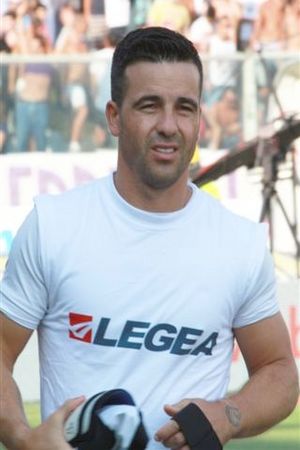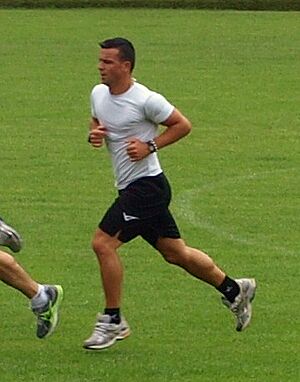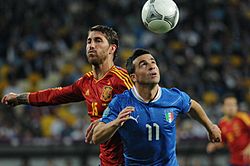Antonio Di Natale facts for kids

Di Natale in 2012
|
||||||||||||||||
| Personal information | ||||||||||||||||
|---|---|---|---|---|---|---|---|---|---|---|---|---|---|---|---|---|
| Full name | Antonio Di Natale | |||||||||||||||
| Date of birth | 13 October 1977 | |||||||||||||||
| Place of birth | Naples, Italy | |||||||||||||||
| Height | 1.70 m (5 ft 7 in) | |||||||||||||||
| Position(s) | Striker | |||||||||||||||
| Youth career | ||||||||||||||||
| 1994–1997 | Empoli | |||||||||||||||
| Senior career* | ||||||||||||||||
| Years | Team | Apps | (Gls) | |||||||||||||
| 1995–2004 | Empoli | 158 | (49) | |||||||||||||
| 1997–1998 | → Iperzola (loan) | 33 | (6) | |||||||||||||
| 1998 | → Varese (loan) | 5 | (0) | |||||||||||||
| 1998–1999 | → Viareggio (loan) | 25 | (12) | |||||||||||||
| 2004–2016 | Udinese | 385 | (191) | |||||||||||||
| Total | 606 | (258) | ||||||||||||||
| International career | ||||||||||||||||
| 2002–2012 | Italy | 42 | (11) | |||||||||||||
| Managerial career | ||||||||||||||||
| 2021–2022 | Carrarese | |||||||||||||||
|
Medal record
|
||||||||||||||||
| *Club domestic league appearances and goals | ||||||||||||||||
Antonio Di Natale, often called "Totò," is a famous Italian football coach and former player. He was a fantastic striker, known for scoring many goals. He was born on October 13, 1977.
Di Natale started his football journey in 1994 with the Empoli youth team. He played for Empoli's main team from 1995 to 2004, with a few short loan spells at other clubs. He helped Empoli get promoted to Serie A, Italy's top league, in 2002.
His best years were with Udinese, where he played from 2004 to 2016. He became the team's captain in 2007. Di Natale was one of the best goal scorers in Serie A, winning the top scorer award twice in 2010 and 2011. He also won the award for the best Italian footballer in Serie A in 2010.
He played for the Italian national team 42 times, scoring 11 goals. He represented Italy in major tournaments like UEFA Euro 2008, the 2010 FIFA World Cup, and UEFA Euro 2012, where Italy reached the final.
Contents
About Antonio Di Natale
Antonio Di Natale was born in Naples, Italy. His family called him "Totò." He started playing football at a young age. At 13, he joined the youth academy of Empoli Football Club. This was the start of his long and successful career in football.
Club Career Highlights
Playing for Empoli
Di Natale moved north to join Empoli's youth system. He was loaned out a few times to other teams. One of his successful loan spells was with Viareggio in 1998–99, where he scored 12 goals in 25 games.
When he returned to Empoli, he became a key player for the first team. In the 2001–02 season, he helped Empoli get promoted to Serie A. He was the team's top scorer that season with 16 goals. In their first season back in Serie A (2002–03), he scored 13 goals, helping Empoli stay in the top league. However, Empoli was relegated back to Serie B after the 2003–04 season.
Time at Udinese

After Empoli was relegated, Di Natale joined Udinese in 2004. In his first season, Udinese finished fourth in Serie A. This meant they qualified for the UEFA Champions League, a big European competition. Di Natale quickly became a very important player for Udinese.
He became the team's captain in 2007. The 2009–10 season was amazing for Di Natale. He scored 29 goals in Serie A, which was more than any other player that season. He broke Udinese's club record for most league goals in a season. He also scored his 100th Serie A goal. For his great performances, he was named the best Italian footballer in Serie A.
He continued his incredible goal-scoring form in the 2010–11 season, scoring 28 goals. He was again the top scorer in Serie A. He helped Udinese finish fourth again, securing another spot in the Champions League qualifiers.
Di Natale kept scoring goals consistently. In 2014, he thought about retiring but decided to play on. He scored his 200th goal in Serie A in November 2014. In 2015, he passed Roberto Baggio to become the sixth-highest goal scorer in Serie A history.
He finally left Udinese at the end of the 2015–16 season. He scored 191 goals in 385 league games during his 12 years with the club. He officially retired from playing football later that year.
International Career
Playing for Italy
Di Natale first played for the Italian national team in 2002. He scored his first international goal in 2004 against the Czech Republic.
He was part of the Italy squad for UEFA Euro 2008. In the quarter-finals against Spain, he missed a penalty kick in the shootout, and Italy lost.
Di Natale also played in the 2010 FIFA World Cup. He wore the number ten shirt. Italy did not do well in this tournament, finishing last in their group. Di Natale scored one goal in a match against Slovakia.
In 2012, he was selected for UEFA Euro 2012. In Italy's first match against Spain, he scored the opening goal in a 1–1 draw. Italy made it all the way to the final of the tournament, but they lost to Spain 4–0.
After Euro 2012, Di Natale decided to stop playing for the national team. He felt tired from the club season and wanted to focus on his club career. He scored 11 goals in 42 matches for Italy.
How He Played
Antonio Di Natale was a quick, smart, and versatile player. He could play anywhere in attack. He was known for his speed, great ball control, and amazing technical skills. He had a fantastic eye for goal and could score with either foot.
He was considered one of the best Italian forwards of his time. Besides his goal-scoring, he was also a great leader and worked very hard on the field. He was also good at taking free kicks and penalty kicks.
Coaching Career
After retiring as a player, Di Natale started a coaching career. In 2018, he joined Spezia as a technical assistant. He then coached their Under-17 youth team.
In April 2021, Di Natale became the head coach of Serie C club Carrarese. This was his first time as a main manager. He helped Carrarese stay safe in the league. He coached the team until July 2022.
Personal Life
Antonio Di Natale married Ilenia Betti in 2002. They have two children, Filippo and Diletta. In 2010, he turned down a chance to join the big club Juventus. He chose to stay with Udinese because his family was happy and settled in Udine.
Di Natale also showed great kindness. After his Udinese teammate Piermario Morosini passed away suddenly during a match in 2012, Di Natale took on the responsibility of supporting Morosini's sister, who needed care.
Career Statistics
| Club | Season | League | Coppa Italia | Europe | Total | |||||
|---|---|---|---|---|---|---|---|---|---|---|
| Division | Apps | Goals | Apps | Goals | Apps | Goals | Apps | Goals | ||
| Empoli | 1996–97 | Serie B | 1 | 0 | — | — | 1 | 0 | ||
| 1999–2000 | 25 | 6 | 5 | 1 | — | 30 | 7 | |||
| 2000–01 | 35 | 9 | 3 | 1 | — | 38 | 10 | |||
| 2001–02 | 38 | 16 | 4 | 2 | — | 42 | 18 | |||
| 2002–03 | Serie A | 27 | 13 | 5 | 1 | — | 32 | 14 | ||
| 2003–04 | 33 | 5 | 2 | 1 | — | 35 | 6 | |||
| Total | 158 | 49 | 19 | 6 | — | 177 | 55 | |||
| Iperzola (loan) | 1997–98 | Serie C2 | 33 | 6 | — | — | 33 | 6 | ||
| Varese (loan) | 1998–99 | Serie C1 | 4 | 0 | — | — | 4 | 0 | ||
| Viareggio (loan) | 1998–99 | Serie C2 | 25 | 12 | — | — | 25 | 12 | ||
| Udinese | 2004–05 | Serie A | 33 | 7 | 6 | 4 | 2 | 0 | 41 | 11 |
| 2005–06 | 35 | 8 | 3 | 3 | 10 | 4 | 48 | 15 | ||
| 2006–07 | 31 | 11 | 2 | 2 | — | 33 | 13 | |||
| 2007–08 | 36 | 17 | 1 | 1 | — | 37 | 18 | |||
| 2008–09 | 22 | 12 | 1 | 1 | 7 | 3 | 30 | 16 | ||
| 2009–10 | 35 | 29 | 3 | 0 | — | 38 | 29 | |||
| 2010–11 | 36 | 28 | 1 | 0 | — | 37 | 28 | |||
| 2011–12 | 36 | 23 | 1 | 1 | 6 | 5 | 43 | 29 | ||
| 2012–13 | 33 | 23 | 1 | 0 | 8 | 3 | 42 | 26 | ||
| 2013–14 | 32 | 17 | 2 | 1 | 4 | 2 | 38 | 20 | ||
| 2014–15 | 33 | 14 | 1 | 4 | — | 34 | 18 | |||
| 2015–16 | 23 | 2 | 2 | 2 | — | 25 | 4 | |||
| Total | 385 | 191 | 24 | 19 | 37 | 17 | 446 | 227 | ||
| Career total | 606 | 258 | 43 | 25 | 37 | 17 | 686 | 300 | ||
International Goals
| # | Date | Venue | Opponent | Score | Result | Competition |
|---|---|---|---|---|---|---|
| 1. | 18 February 2004 | Stadio Renzo Barbera, Palermo | 2–1 | 2–2 | Friendly | |
| 2. | 15 November 2006 | Stadio Atleti Azzurri d'Italia, Bergamo | 1–0 | 1–1 | Friendly | |
| 3. | 22 August 2007 | Ferenc Puskás Stadium, Budapest | 1–0 | 1–3 | Friendly | |
| 4. | 12 September 2007 | Olympic Stadium, Kyiv | 1–0 | 2–1 | UEFA Euro 2008 qualifying | |
| 5. | 2–1 | |||||
| 6. | 30 May 2008 | Stadio Artemio Franchi, Florence | 1–0 | 3–1 | Friendly | |
| 7. | 2–0 | |||||
| 8. | 6 September 2008 | Antonis Papadopoulos Stadium, Larnaca | 1–0 | 2–1 | 2010 FIFA World Cup qualification | |
| 9. | 2–1 | |||||
| 10. | 24 June 2010 | Ellis Park Stadium, Johannesburg | 1–2 | 2–3 | 2010 FIFA World Cup | |
| 11. | 10 June 2012 | PGE Arena Gdańsk, Gdańsk | 1–0 | 1–1 | UEFA Euro 2012 |
Managerial Statistics
As of 11 July 2022
| Team | Nat | From | To | Record | ||||
|---|---|---|---|---|---|---|---|---|
| G | W | D | L | Win % | ||||
| Carrarese | 11 April 2021 | 11 July 2022 | 43 | 11 | 17 | 15 | 25.58 | |
| Total | 43 | 11 | 17 | 15 | 25.58 | |||
Awards and Achievements
Empoli
- Coppa Italia Serie C: 1995–96
Italy
- UEFA European Championship runner-up: 2012
Individual
- Capocannoniere (Serie A Top Scorer): 2009–10, 2010–11
- Serie A Italian Footballer of the Year: 2010
- Serie A Fair Play Prize: 2010
- Pallone d'Argento: 2011
- Premio Nazionale Carriera Esemplare "Gaetano Scirea": 2011
- Serie A Goalscorer of the Year: 2011
- Serie A Team of the Year: 2010–11, 2011–12, 2012–13
- Coppa Italia top scorer: 2014–15
See also
 In Spanish: Antonio Di Natale para niños
In Spanish: Antonio Di Natale para niños
 | Anna J. Cooper |
 | Mary McLeod Bethune |
 | Lillie Mae Bradford |


